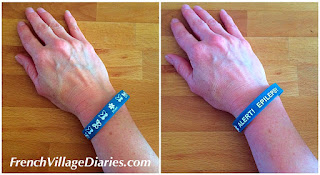 |
| National Epilepsy Week 2016 |
Today marks the start of National Epilepsy Week in the UK, where
600,000 people suffer from epilepsy. This week, Epilepsy Action want to get as
many people as possible talking about epilepsy, something I have only recently felt happy about doing. You can read my story here. Today I'm talking about first aid for epilepsy, so would you know what to do
if you witnessed someone having a seizure?
Like Adrian experienced, one minute you are talking to someone, then
you get back to what you were doing and the next time you glance up, they are
face down on the ground, twitching and unresponsive. What next?
In a way, I was lucky. I was out of it. I didn’t get that stomach
churning moment of panic. It wasn’t me who was shouting my loved ones name and
getting no response. It wasn’t me who had to think quickly, find help and then
be there to support, explain and pick up the pieces after the event. He said it
was one of the most frightening moments of his life.
Shock, panic and adrenalin will try to take over, but you are more
likely to be calm and thinking clearly if you are prepared. Thanks to the
Epilepsy Action website, here is a handy guide that I hope you’ll never have to
use, but one day might come in useful.
 |
| My medical alert bracelet |
Do...
Protect the person from injury - (remove harmful objects from nearby)
Cushion their head
Look for an epilepsy identity card or identity jewellery
Aid breathing by gently placing them in the recovery position once the
seizure has finished (see pictures)
Stay with the person until recovery is complete
Be calmly reassuring
Don't...
Restrain the person’s movements
Put anything in the person’s mouth
Try to move them unless they are in danger
Give them anything to eat or drink until they are fully recovered
Attempt to bring them round
Call for an ambulance if...
You know it is the person’s first seizure, or
The seizure continues for more than five minutes, or
One tonic-clonic seizure follows another without the person regaining
consciousness between seizures, or
The person is injured during the seizure, or
You believe the person needs urgent medical attention
Please feel free to share this post with your friends. The more people
who are aware of what to do and what not to do when someone is having a
seizure, the better.
If you have found this useful, please think about making a donation to
Epilepsy Action to help them support those with epilepsy and their families.
Adrian and I are delighted to have raised £283 so far via our JustGiving page
and even if it is only the price of a cup of coffee, every little you can give helps.
You can click here to donate, thank you.
 |

No comments:
Post a Comment
Please don't be shy, I love to hear from you.